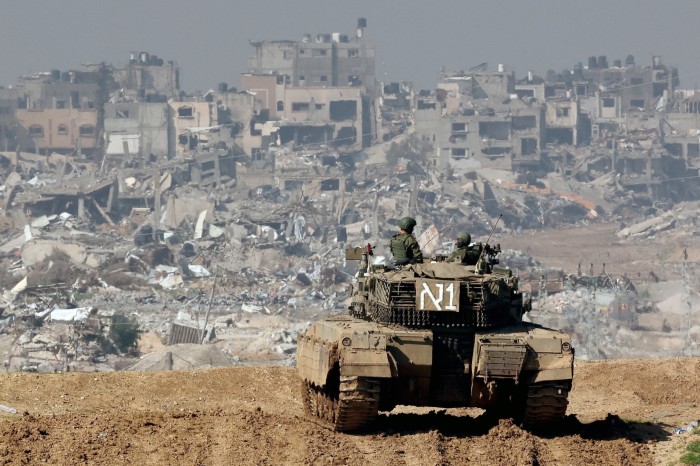The International Court of Justice has heard its share of high-profile cases. But few have been as closely watched, or as politically explosive, as South Africa’s suit alleging that Israel was committing genocide against the Palestinians in the war in Gaza.
A final ruling on South Africa’s claims — which Israel has furiously denied as “profoundly distorted” — is likely to take years. But in the coming days, the court’s 17 judges are expected to make their first decision in the case: whether to grant South Africa’s request for a range of emergency measures meant to rein in Israel’s assault on Gaza.
Even before the judges issue their decision, however, the fact that a western-backed democracy has been accused in court of the highest international crime has made waves around the world. For Israel and its allies, the case is baseless and an outrage. But for Palestinians and their supporters, particularly in the Global South, the case is a test of the credibility of an international system they have long regarded as stacked against them.
“Few conflicts in the world have such global reverberations as this one . . . All over the world people have a position on this,” said Dahlia Scheindlin, a Tel Aviv-based pollster and political analyst. “So I can imagine any decision by the court is going to inflame both sides in one way or the other.”

In Israel, still reeling from the October 7 attack by Hamas that killed 1,200 people and ignited the war, South Africa’s case has been met with incomprehension and anger, especially as the 1948 Genocide Convention under which it was brought was drawn up in response to the Holocaust, during which the Nazis and their collaborators killed 6mn Jews.
“A terrorist organisation carried out the worst crime against the Jewish people since the Holocaust, and now someone comes to defend it in the name of the Holocaust? What brazen gall,” said Israel’s Prime Minister Benjamin Netanyahu after South Africa launched its case. “South Africa’s hypocrisy screams to the high heavens.”
For Palestinians, however, the case offers something very different: hope of increased international pressure on Israel to end its devastating assault on Gaza, which has now killed more than 25,200 people and displaced 1.9mn of the enclave’s 2.3mn inhabitants. They also see it as a chance to hold Israel to account for its oppression of them for the past three-quarters of a century.
“(This) is the first serious international effort at ending this appalling situation and demanding accountability after 75 years of being denied our basic rights, equal to all other peoples,” said Husam Zomlot, the Palestinian ambassador to the UK.
“This is a defining moment. Should the ICJ stick to its legal mandate and succeed in its ruling, it (will) have succeeded for itself and for the rules-based international order. Should it fail, I think it would have failed itself, its mandate, and the entire rules-based order.”

In deciding whether to apply emergency measures, the court must determine whether Israel’s alleged actions are capable of being covered by the Genocide Convention, and whether emergency measures are needed to protect the rights of Palestinians in Gaza, a far lower threshold than that required to uphold South Africa’s overall case.
If it decides this bar has been met, the court can impose some or all of the measures requested by South Africa, which range from an immediate suspension of Israel’s military operations in Gaza to stopping incitement to commit genocide, or others of its own choosing.
“Whichever side prevails at this preliminary stage will feel vindicated legally,” said Chimène Keitner, a professor of international law at the University of California Davis School of Law. “Whereas it really is just the first step in a much more nuanced and more time-consuming process.”
The most immediate impact of any emergency measures, if Israel agreed to abide by them, would be on the war in Gaza. Legal analysts doubt the court would order Israel to halt operations, not least because it cannot order Hamas — which is not subject to the case and still holds about 130 hostages it seized on October 7 — to do the same. But other options, such as ordering increased humanitarian assistance, or access for independent investigators, are seen as more likely.
But analysts said that even if Israel chose to ignore any orders issued by the court, the mere fact they had been issued could still influence how other countries dealt with it, for example by making them less willing to sell weapons to Israel, or more willing to impose sanctions. Some think a final finding against Israel could influence proceedings at other courts, such as the International Criminal Court, which deals with individual, rather than state, actions.
“The Genocide Convention is the apex convention. It’s the crime of crimes,” said Sheila Paylan, an expert on international law and human rights. “So it is a very explosive moment.”
For the court itself, there is also much at stake. Keitner said the South Africa-Israel proceedings were the latest in a series of cases that suggested, given the longstanding paralysis at the UN Security Council, states were increasingly prepared to turn to other international bodies, such as the ICJ, for pronouncements on urgent humanitarian issues.
This trend, she said, posed both opportunities and risks for the ICJ: it could ultimately boost the court’s influence; but there was also a risk the court could increasingly be drawn into cases that would leave it open to accusations of being politicised.
“It could cut two ways. It could help the ICJ be an even more active and responsive body in the international legal system, especially in light of Security Council paralysis,” she said.
“But the risk is that the ICJ would be (faced) with complaints in either every humanitarian disaster or in selective humanitarian disasters. And that would, I think, fundamentally change the role it has played to date.”
Additional reporting by Rob Rose in Johannesburg and Raya Jalabi in Beirut